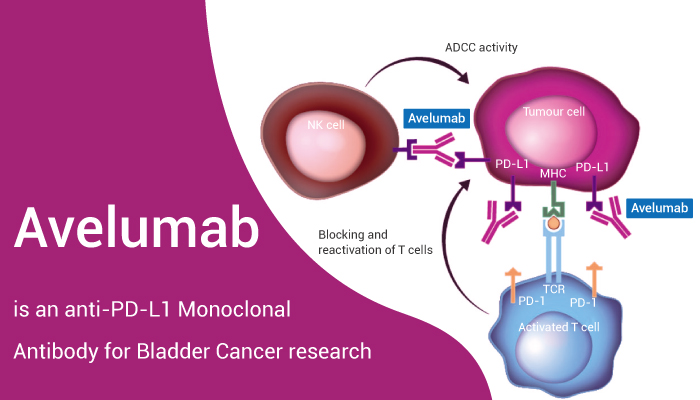PD-1/PD-L1, refers to immune checkpoint programmed cell death protein 1 (PD-1) and its main ligand, Programmed death ligand 1. Linked to multiple cancer types. PD-L1 is mainly expressed on a variety of human and mouse tumor cells and some immune cell populations. The expression of PD-L1 on the surface of tumor cells increased with the production of T cell-associated IFNγ. Increased expression of PD-L1 can induce apoptosis or non-responsiveness of antigen-specific T cells and inhibit tumor immunity. To suppress immunosuppressive signals between immune cells and infected or tumor cells, the researchers developed PD-1/PD-L1 antibodies. PD-1/PD-L1 antibodies can target the interaction between PD-1 on immune cells and PD-L1 on tumor cells to overcome immune resistance in preclinical models.
Avelumab is a specific whole-human IgG1 anti-PD-L1 monoclonal antibody (mAb). It is the only anti-PD-L1 mAb that can both induce antibody-dependent cell-mediated cytotoxicity (ADCC) and block the PD-1/PD-L1 pathway.

Avelumab increases the sensitivity of cancer cells to natural killer (NK) cleavage, mediating ADCC associated with overexpression of PD-L1.
Avelumab binds both human and mouse PD-L1 with high affinity, Kd=0.3 and 1.0 nmol/L, respectively. CD16 (FC-γriII) on NK effector cells interacts with the Fc portion of antibodies that recognize target cells, resulting in ADCC-mediated NK cell lysis. Avelumab (2 μg/mL; 30 min) increases NK-cell lysis in IFN-γ treated chordoma cells (UM-Chor1 cells, JHC7 cells). So Avelumab increases the sensitivity of chordoma cells to NK cell lysis via ADCC. Especially the chordoma cells with IFN-γ-induced PD-L1 overexpression. CD8+ T cell co-cultured UM-Chor1 cells are also highly sensitive to Avelumab-mediated ADCC.
In the C57BL/6 mice bearing subcutaneous MB49 tumors model, Avelumab (400 μg, 100 mL; i.p.; 3 times at 3 days apart) inhibits tumor development. Average tumor volume has decreased, mouse survival increases, and even complete regression occurs. However, the effect remainds poor in mice with depleted CD4 or CD8 cells.
In summary, Avelumab is a potent antibody inhibitor that acts against a variety of cancer cells, including bladder cancer. Avelumab mediated ADCC can cause NK cell lysis to kill tumor cells.
References:
[1] Fujii R, et al. Oncotarget. 2016 Jun 7;7(23):33498-511.
[2] Vandeveer AJ, et al. Cancer Immunol Res. 2016 May;4(5):452-62.